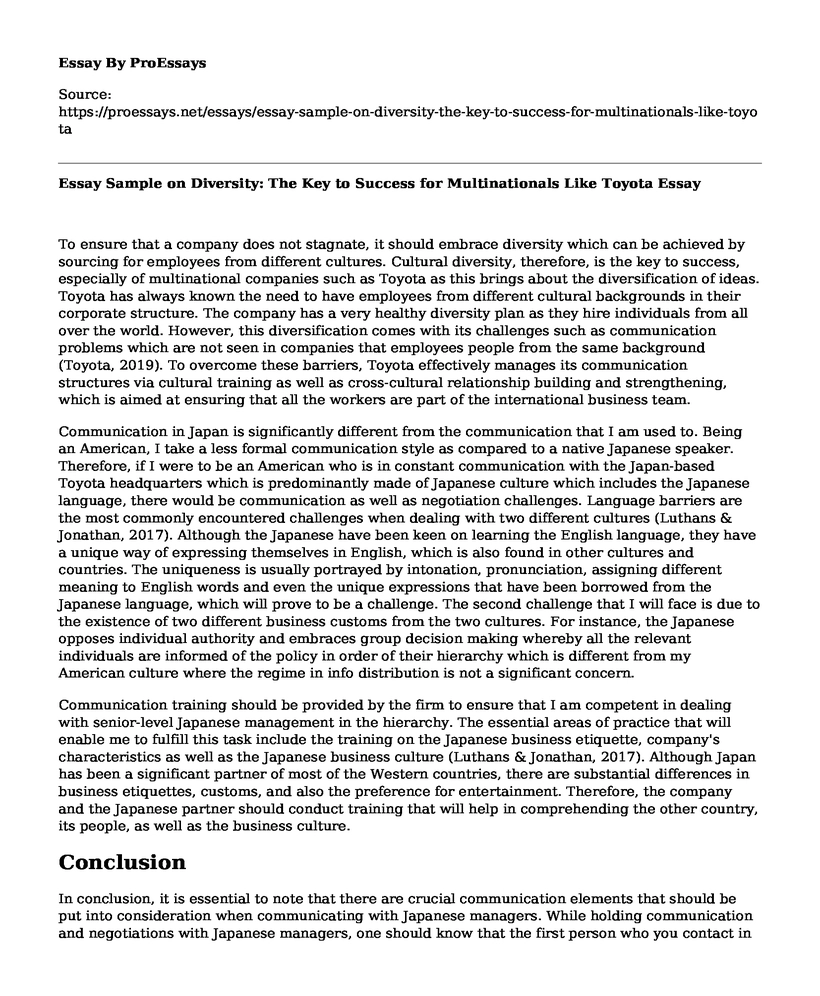To ensure that a company does not stagnate, it should embrace diversity which can be achieved by sourcing for employees from different cultures. Cultural diversity, therefore, is the key to success, especially of multinational companies such as Toyota as this brings about the diversification of ideas. Toyota has always known the need to have employees from different cultural backgrounds in their corporate structure. The company has a very healthy diversity plan as they hire individuals from all over the world. However, this diversification comes with its challenges such as communication problems which are not seen in companies that employees people from the same background (Toyota, 2019). To overcome these barriers, Toyota effectively manages its communication structures via cultural training as well as cross-cultural relationship building and strengthening, which is aimed at ensuring that all the workers are part of the international business team.
Communication in Japan is significantly different from the communication that I am used to. Being an American, I take a less formal communication style as compared to a native Japanese speaker. Therefore, if I were to be an American who is in constant communication with the Japan-based Toyota headquarters which is predominantly made of Japanese culture which includes the Japanese language, there would be communication as well as negotiation challenges. Language barriers are the most commonly encountered challenges when dealing with two different cultures (Luthans & Jonathan, 2017). Although the Japanese have been keen on learning the English language, they have a unique way of expressing themselves in English, which is also found in other cultures and countries. The uniqueness is usually portrayed by intonation, pronunciation, assigning different meaning to English words and even the unique expressions that have been borrowed from the Japanese language, which will prove to be a challenge. The second challenge that I will face is due to the existence of two different business customs from the two cultures. For instance, the Japanese opposes individual authority and embraces group decision making whereby all the relevant individuals are informed of the policy in order of their hierarchy which is different from my American culture where the regime in info distribution is not a significant concern.
Communication training should be provided by the firm to ensure that I am competent in dealing with senior-level Japanese management in the hierarchy. The essential areas of practice that will enable me to fulfill this task include the training on the Japanese business etiquette, company's characteristics as well as the Japanese business culture (Luthans & Jonathan, 2017). Although Japan has been a significant partner of most of the Western countries, there are substantial differences in business etiquettes, customs, and also the preference for entertainment. Therefore, the company and the Japanese partner should conduct training that will help in comprehending the other country, its people, as well as the business culture.
Conclusion
In conclusion, it is essential to note that there are crucial communication elements that should be put into consideration when communicating with Japanese managers. While holding communication and negotiations with Japanese managers, one should know that the first person who you contact in a Japanese company (usually managers) will be present throughout the negotiation period as it is part of their business culture. It is also evident that the Japanese typically negotiate in teams with members having different specialty while the decision making is communal. During the negotiations, there is a senior member of staff who dictates tactics but rarely does the talking. Each manager will ask and answer questions within his or her field of competence. Any non-Japanese employee who enters the firm and asks for advice and guidance regarding how to communicate and negotiate more effectively with the Japanese should be advised that he or she should the business culture of the Japanese and try to master some of their negotiation and communication skills.
References
Luthans. F & Jonathan D, (2017). International Management: Culture, Strategy, and Behavior 10th Edition. Retrieved from: https://player-ui.mheducation.com/#/epub/sn_4a64#epubcfi(%2F6%2F126!%2F4%2F6%5Bdata-uuid-303228ea05314055bd10b8536233df31%5D)
Toyota, (2019). Vision and Philosophy. Cultural Diversity. Retrieved from: https://global.toyota/en/company/vision-and-philosophy/
Cite this page
Essay Sample on Diversity: The Key to Success for Multinationals Like Toyota. (2023, Feb 09). Retrieved from https://proessays.net/essays/essay-sample-on-diversity-the-key-to-success-for-multinationals-like-toyota
If you are the original author of this essay and no longer wish to have it published on the ProEssays website, please click below to request its removal:
- Paper Example on Professional Skills
- Essay Example on Performance Management
- Analysis of the Financial Position of Nike Inc.
- Institutional Entrepreneurship, Service Innovation and Operation Management of Service-Oriented Government in China
- Western Sectoral Sanctions on Russian Oil Industry Paper Example
- Essay Sample on Hospitality Industry Transforms to Meet Digital Age
- Free Research Paper Sample: Emerging Tech Key to Adapting to VUCA Environments







